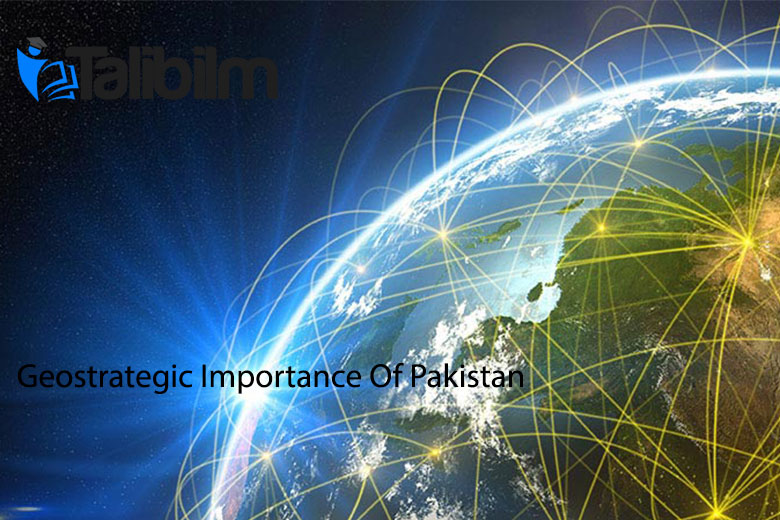What Geostrategic Means
Referring to the Geostrategic importance of Pakistan, it means the significance of its location, geographically. Geostrategy forms a sub section of geopolitics, which is a kind of foreign policy, which in principle manoeuvre geographical factors which are constraining, informing or affecting both political & military scheduling.
Geostrategic Importance Of Pakistan
Pakistan’s geostrategic location plays a highly important part in shaping as well as influencing the region’s dynamics. Therefore, its neighboring countries that are finding themselves coerced, to depend on Pakistan regarding their tactical interests.
Regrettably, Pakistan’s foreign policy, during its past, consistently lacked a rational framework & vision in perceiving this strategically & predesigned congenial setup.
Pakistan, rather than converting its strategic location to its advantage, turned it into a curse. Since Pakistan’s inception, this curse was exploited by foreign countries, particularly the super powers. However, the state’s stakeholders allowed such powers to do their exploitation.
Over a period of time, the state’s indiscretions lead to national suffering. The societal structures of Pakistan were badly affected, whilst the economy sustained serious damages too.
The Geographical Location of Pakistan
Pakistan is situated within southern Asia and its location is between the 24&36.5 – Northern latitude, whilst its between the 61&75.5 – Eastern latitude.
Pakistan forms the bridge between South-West Asia and South Asia, whilst its region is approximately 803,940 square kilometers.
Afghanistan is situated towards Pakistan’s North Western region. Its border with Afghanistan is estimated to be 2,250 kilometers long.
In Pakistan’s north, it is running along the Hindu Killer Mountain ridges (Hindu Kush) as well as the Pamirs. The Wakhan Corridor, a narrow scant of Afghan territory, is extending between Pakistan & Tajikistan and its length is approximately 16-25 kilometers.
The Durand Line forms the border line between Afghanistan & Pakistan. During 1893, Sir Mortimer Durand, the British India foreign secretary had drawn the line, which was endorsed by Afghanistan’s’ ameer during the same year.
During 1947 Pakistan became an independent state, despite the fact that in later years its legitimacy was periodically disputed both by the government of Afghanistan and Pakhtun tribes, extending across the Pakistan – Afghanistan boundary.
According to Afghanistan the Durand Line was foisted by a superior power on an inferior power. It was in favor of establishing yet another state, either called Pakhtunistan or Pashrunistan.
Pakistan insisted on the permanence and legality of the border as the devisee of the British and in 1994 the Durand Line remained in effect.
Geostrategic importance of Pakistan & Kashmir Region
Pakistan controls approximately 84,159 square kilometers in the North-east of the country of Kashmir & Jammu, a previous princely state. This region which consists of Azad Kashmir – 11,639 sq kilometers as well as 72,520 sq kilometers, nearly all of the Northern Regions, including Baltistan & Gilgit are the most beautiful parts of Pakistan.
In the Northern Regions, 5 of the globe’s 17 highest mountains are situated. It also contains extensive glaciers, sometimes dubbed the third pole. However, since 1947 the border line remains a crucial matter between India and Pakistan.
Since 1984, the Siachen Glacier located within northern Kashmir became a significant fighting arena between India and Pakistan. However, more soldiers succumbed for being exposed to the cold compared to those dying from clashes in this conflict.
A boundary of approximately 520 kilometers runs south-east between Pakistan & China. It runs from the eastern side of the Pakistan-Afghanistan border and end in the vicinity of the Karakoram Pass.
However, this line was established between 1961 – 1965 in a sequence of settlements between Pakistan & China. By mutual consent, between Pakistan & China a new treaty, regarding the boundary, will be negotiated after the dispute about Kashmir between Pakistan & India is resolved.
Geostrategic importance of Pakistan with Indian Border:
The border between India & Pakistan, which is locally known as the IB (International Border), poses to be the international border between Pakistan & India which delimit the Indian states – Rajasthan, Gujarat & Punjab from the provinces of Sindh & Punjab. India is bordered by Pakistan in the East. This border was established during 1947 when Pakistan separated from India.
The LOC (Line of Control) forms the separation of Jammu, administered by India & Kashmir, administered by Azad Kashmir, from Pakistan. The ceremonial crossing point between Pakistan & India, Wagah, lies alongside the border between Amritsar, the Indian city & Lahore, the Pakistani city. It is within close range of the urban sprawl of both cities.
Pakistan’s boundary with Iran, which is approximately 800 kilometers long, was initially delimited during 1893 and managed by a British-commission. It separated Iran from British Indian Balochistan, at that stage.
During 1957 a frontier agreement was signed between Pakistan & Iran. Henceforth, no serious disputes took place. The Indian Ocean & Arabian Sea are located in Pakistan’s southern region. Pakistan’s coastal belt is approximately 700 kilometer long.
However, the significance of Pakistan is further enhanced because it is located in the vicinity of the Persian Gulf. This is where 65% of the world’s oil is produced!
In its regional as well as global perspective, the geostrategic importance of Pakistan, can be better comprehended. Four countries surround Pakistan and somehow or another, Pakistan’s presence is crucial to its neighbouring countries, which also raises its international significance.
Geostrategic importance of Pakistan with Afghanistan:
Afghanistan is in general seen as an epicenter for global terrorism as well as a producer of opium. Thus, the international community which includes the US acknowledges the fact that without Pakistan’s cooperation and active support, peace is impossible in Afghanistan.
The primary motive of the Soviet Union’s invasion of Afghanistan was to commence to the Arabian Sea. Opposed to the common misinterpretation, the Soviet invasion poses to be a serious peril to the global powers’ interests, at a greater extent than it was posing a threat to Pakistan’s mere existence, whilst it was just used as a mere buffer country.
Geostrategic Importance of Pakistan: Alliance with the United States of America
Pakistan’s consistent involvement as an ally of the United States in Afghanistan, hurled the country into a crisis which still haunts the Pakistani nation until now. Pakistan made a miscalculation of its tactical relations with the US which were more interested in the transactional environment.
Pakistan should seriously review its dealings with the United States as its interests during the past and up till today in South Asia, were completely in contradiction to the Pakistani government’s national interests. And one group still believes that Pakistan did absolutely correct because without USA support we cannot get the growth
The interference and involvement of America and other countries established highly challenging issues for the homeland. Pakistan experienced peculiar relations with the United States as its strategic ally. Throughout various historic events like the Cold War, containment of Communism and currently China’s containment.
These events were only serving the regional interest of the US and not benefit the Pakistani interest.
Both political & economic stability may play a crucial role to strengthen Pakistan in overcoming major regional problems. The main interests of the US in the South Asia region include: establishing India as a regional power, containment of China and to isolate Iran. Whilst issues might pose to be common in nature, it’s a fact that the United States cannot ever be Pakistan’s ally in true sense, because its interests are entirely different.
With the revision or Pakistan’s relations with the US, it should be creating space now to strengthen its relations with both China & Iran. However, it should not compromise its position.
Pakistan was relegated to the background due to lacking both confidence and policy. The principle factors which contribute to the bad history of the United States / Pakistan relations include:
- Lacking convergence of interest
- Mutual distrust
- Lacking interactive economic interest
Regrettably, Pakistan did not pursue its foreign policy objectives in a robust manner. Lacking both cohesion & consistent policies pose to be the principal reasons of ineffective and bad diplomacy. Over the last few years, Pakistan lost its space where US diplomacy is concerned.
However, Pakistan should have accomplished vigorous diplomacy. The criticism & attitude of the United States towards the CPEC & BRI is deemed to be a rather lame excuse.
Due to fundamental differences, the relations between Pakistan and the United States, throughout history, remained hostile. Normalization in the relations between Pakistan and the United States can’t be reached unless fundamental changes take place.
The geostrategic importance of Pakistan, should be capitalized, whilst a redefinition of its relations with India, the United States and other neighbouring countries should be prioritized.
Thus, Pakistan should continuously strengthen its relations with both China & Afghanistan and not compromise its national interest. And increasing Indian influence in Afghanistan poses to be dangerous for Pakistan.
Furthermore, Pakistan should not remain a hostage of the United States’ interest. Numerous peace talks were destroyed & sabotaged by the US. This portrays the United States’ resolution regarding peace in this region. Peace talks matter a lot but we should also take great care of our cultural values and there must not be any compromise over the sovereignty of our nation.
Pakistan should have meetings to discuss a successful coordinated response towards the US. In this unpredictable era the series of events are frequently changing and as a region, South Asia is staying in the frontline as far as the regional concerns & interests of the US are concerned.
The Trump administration brought a blend of continuity & change in the in the United States’ security & foreign policies, which includes South Asia. It is advisable that Pakistan should continuously review its position according to the changing scenario.
Political & economic stability
The political & economic stability may form a crucial part to bring Pakistan back into a powerful position whilst overcoming the principal issues in the region.
Such issues are affecting Pakistan either in a direct or indirect manner, whilst good relations with its neighbours are of vital importance. Pakistan is currently busy on its eastern & western boundaries. That’s the reason why Pakistan has to establish a good working relationship, especially with its neighbors on the western border.
Geostrategic importance of Pakistan
By doing this, Pakistan can ensure the CPEC and more mega projects will benefit the homeland, whilst the geostrategic importance of Pakistan will be utilized in a positive manner.




